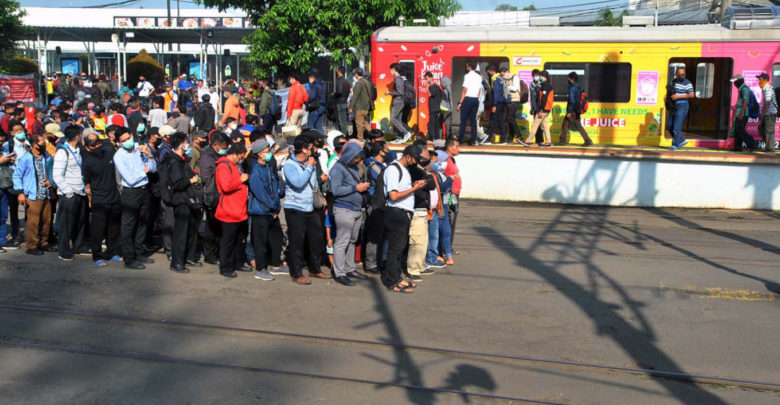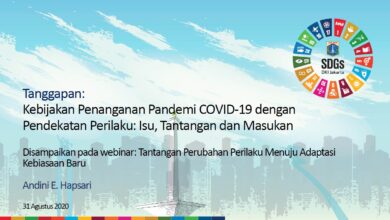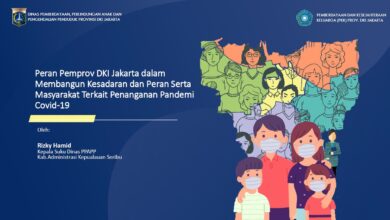
Urban life is slowing down in Greater Jakarta, the region hit hardest by COVID-19, after authorities imposed large-scale social restrictions (PSBB) in the past weeks.
The outbreak has also largely reduced the number of commuter line passengers, but crowds of workers who cannot afford to work from home reportedly persist in certain stations and trains during rush hours.
State-owned commuter line operator PT Kereta Commuter Indonesia (KCI) recorded an average of 190,000 passengers a day on the Bogor-Jakarta and Bekasi-Jakarta routes during the outbreak, a decrease of around 80 percent from around 950,000 passengers on normal days.
Since the epidemic hit Greater Jakarta, KCI has shortened its service hours to 6 a.m. to 6 p.m. and reduced the number of daily trips from 991 to 761. These trains were mostly empty almost every day before Ramadan began on April 24, with only 10 percent of trains having been filled with a large number of passengers.
But now, passengers numbers have been spiking on the last three trains before iftar at around 6 p.m., jeopardizing efforts to maintain physical distance between passengers.
Fearing that passengers would continue defying orders to maintain distance, leaders of Greater Jakarta — five of Jakarta’s satellite cities, abbreviated as “Bodebek”, under the jurisdiction of the West Java administration — appealed to the central government to, once again, temporarily halt commuter line services.
They are also planning to file a formal request to the Transportation Ministry in a bid to curb transmission in public transit systems after three potential railway passengers recently tested positive for COVID-19.
Bogor Mayor Bima Arya Sugiarto said their priority was demanding the ministry temporarily halt commuter line services. In return, offices and factories that are still allowed to operate must provide shuttles for their employees.
Another option, he said, was to lengthen commuter line operational hours and filter prospective passengers prior to entering the stations so as to reduce the number of passengers, which would improve physical distancing.
“If this is the case, there has to be a selection mechanism for people who enter the stations. For instance, by showing an employment letter from their companies,” Bima said on Tuesday, as quoted by Antara news agency. “Therefore, people who just want to wander around [without urgency] cannot [board trains].”
The appeals were made on Tuesday after the five Bodebek leaders discussed ways to prevent transmission of the virus on public transport.
Three people tested positive for COVID-19 after they took a polymerase chain reaction (PCR) in Bogor Station, one of the major stations in Greater Jakarta, last week. Three more passengers also tested positive in PCR testing in Bekasi Station on Tuesday, officials have said.
All these passengers were asymptomatic, KCI spokesperson Anne Purba told The Jakarta Post on Wednesday.
Hermawan Saputra of the Indonesian Public Health Expert Association (IAKMI) said the vast commuter line network was the most vulnerable public transportation mode to coronavirus transmission because passengers would not be able to maintain physical distance on a crowded train during rush hours. Not to mention that respiratory droplets containing the virus may land on surfaces and persist up to several days inside the train, he said.
The “rush-hour problem”, Anne said, had caused the KCI to impose additional restrictions for potential passengers aside from its regular COVID-19 mitigation measures — such as the mandatory mask-wearing and body temperature checks.
“To improve discipline, starting on May 4, any trains that have a car filled with more than 60 passengers [or a fourfold decrease from the normal capacity per car] will not depart unless [passengers] reduce their numbers,” she said.
She went on to say that KCI was open to cooperation with local administrations to “filter prospective passengers entering stations”.
Hermawan said banning all non-urgent passengers from using commuter trains was one option, although at the same time he doubted the efficacy and questioned the methods to filter these passengers.
“Here [in Indonesia], people always have excuses to defy new policies. Some people would always try to find excuses to board trains,” he said.
He said suspending all commuter line services would be the better solution to contain the spread of the disease.
Deddy Herlambang, a researcher at the Transportation Study Institute (INSTRAN), said keeping all public transportation services running during the outbreak was crucial to even out the proportion of passengers across different modes of transportation.
“Halting commuter line service would cause other public transportation modes to experience high demand. For instance, buses or motorcycle taxis,” he said.
Any decisions, he said, would be ineffective if authorities failed to resolve the underlying causes of the problem — commuting workers who are struggling to make ends meet during the epidemic, people lacking discipline in adhering to physical distancing and social norms that dictate that attending an iftar meal with family at home is better than being alone.
He suggested that authorities should look beyond the public health aspect and consider more social, economic and cultural factors.
Artikel ini telah tayang di thejakartapost.comdengan judul “Curbing transmission on public transport not as simple as banning passengers: Experts”, https://www.thejakartapost.com/news/2020/05/07/curbing-transmission-on-public-transport-not-as-simple-as-banning-passengers-experts.html
Penulis : Sausan Atika
Editor : The Jakarta Post
Foto Cover : Passengers neglect to maintain a safe distance from one another while waiting for a Commuter Line train on April 14, 2020 at Bogor Station in the West Java city. (Antara/Arif Firmansyah)



